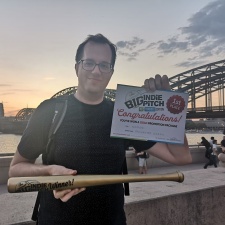The Big Indie Pitch is a regular event run by the makers of Pocket Gamer and PC Games Insider. It sees indie developers engage in a speed-dating-styled pitching competition for fame and those sweet, sweet promotional packages.
The event gives indies five minutes to pitch their games to a panel of press, publishers and industry pundits. The judges then pick three winners and everybody gets valuable feedback.
The indie view
The Big Indie Pitch is getting bigger and bigger as we bring it to events all across the world. To give you an idea of what the event is like, who attends the events and the games on show, we've sat down with a number of past Big Indie Pitch contestants to offer their views.
Today, we're speaking to Marnix Licht from Enchanted Works, who submitted Nomori to The Big Indie Pitch at Gamescom 2022 and walked away as the winner.
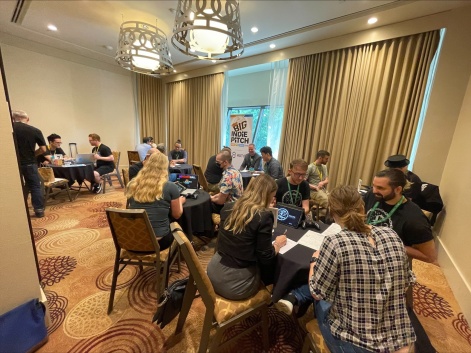
Sophia Aubrey Drake: Tell us a little about yourself and your indie studio - who is on the team, and what are their inspirations?
Marnix Licht: Hi, my name is Marnix Licht. This is probably going to be a longer answer than you would like. But my backstory is a little bit unusual. I originally started out studying Physics and Astronomy. I have always been fascinated by the universe and all its wonders. Things like black holes, general relativity, and the expansion of the universe, just to name a few. These reality-altering physics phenomena are a major inspiration for both our current and future projects.
Eventually, I ended up as a teacher with a bachelor of education in both Physics and Chemistry. I kept this up for 7 years, which probably helped with the big indie pitch as well. If you can fascinate a room full of teenagers, any other type of audience becomes relatively easy.
During this period I found a love for Minecraft and creating so-called Redstone creations, think electric circuitry, but with blocks. At some point, I started sharing my creations online via youtube. This started as a hobby but eventually ended to the point where I could sustain myself from ad revenue. With over 100k subscribers, which was a decent amount at the time, and several viral videos that made Minecraft history such as this one.
These creations also involved the release of several popular Minecraft minigames, both for single-player and multiplayer, played by millions of players worldwide. For instance, Missile Wars which is still popular today 8 years later.
An obvious question slowly arose. People seem to enjoy the things I make in Minecraft. What if I started making my own video games? But I had never done any programming, 3d modelling, or art at the time, besides with blocks. Regardless I made a formal application for a highly regarded Art School with a Game Design course and got promptly rejected based on my lack of both technical and artistic capabilities and was put on the waiting list. It seems a portfolio filled with nothing but Minecraft content is not a very good way of applying to an Art School. Now I don't exactly know what transpired, but at the last possible moment, I got accepted from the waiting list. Now four years later I graduated as one of the university's top students.
During these four years, I learned so much and met so many incredible people, some of which I am now lucky to call my colleagues. Essentially we started our company in April this year, during our graduation period. And we have been focused on forming both our company and our first project ever since. At the moment we have a core team of five members but are expecting to expand in the next two years.
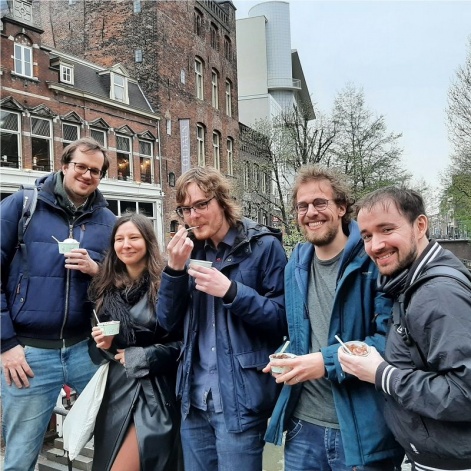
Our current team from left to right:
Marnix Licht: Game Designer, Technical Programmer & Business Developer
Myrthe ter Pelle: Creative Director & Generalist. An incredible creative dreamer with a unique sense of style. Takes inspiration from the school of Art Nouveau, ancient folklore, and mythology from all over the world. The main reason why Nomori took the direction it is in right now.
Joeri Ridder: Game Designer, Gameplay Programmer. A talented designer with an eye for detail and playful design. He takes inspiration from works of art that make you question or rethink the way the universe works and what that means to you. For games, a game like Fez left a big impression in that regard.
Erik Wiersma: Technical Artist & Generalist. A wizard when it comes to procedural art. You blink twice and there are several iterations of an asset or sometimes even entire levels that appeared out of nowhere. His biggest inspiration is human design where form and function live in harmony to create a stunning design.
Geoffrey Hendrikx: Lead Programmer. The foundation on which our projects stand. Handles our architecture and makes sure the rest of us stick to clean well written code. His big inspiration is Edmund McMillen known for his work on games like Super Meat Boy and the Binding of Isaac.
Tell us about Nomori that you pitched at the competition.
Imagine if Portal 2 and Ghibli movies had a baby, then Nomori would be that baby. That is our aim. A game with deep mechanical complexity deriving from seemingly simple mechanics, set in a beautiful spirit world, with lively characters that take the player on a Ghibliesque journey, all to preserve a sacred forest and thereby the world of Nomori that is tied to it.
It’s a game whose mechanics are heavily inspired by the art piece Relativity, created by Dutch artist M.C. Escher.
In a world whose rules and principles of reality are unlike what players have experienced before. Nomori is a game about traversal at its core. A game of trying to figure out how you can manipulate the principles that govern the world to your advantage to get from point A to point B, wherever that point B might be.
The game has three core principles that all revolve around relativity:
- Every object in the world has its own relative perspective, which never changes.
- Every object has a limited relative history that can be time-reversed.
- Two Non-Euclidean Portals that are connected in the world and that both objects and the player can travel through can have different relative orientations and can sometimes be rotated.
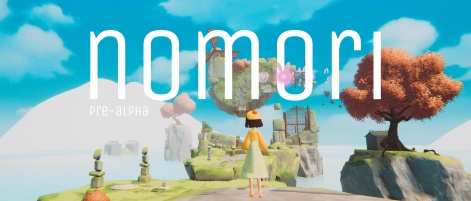
These are already complex principles to grasp on their own and even more so when you start combining them and thinking about the implications. This is why in the game they are introduced and explored very gradually as the player progresses.
In early playtests we quickly discovered that players who became increasingly more proficient managed to manoeuvre themselves to places we hadn’t even considered possible. Which sometimes ended in disappointment with a piece of geometry not having a collider. So one of our current Design Pillars is: “Every piece of scenery needs to have a collider and needs to be worth exploring”.
In the current state of the pre-alpha, the world, while very zen-like is devoid of life. We are currently hard at work, working towards the vertical slice of the game and bringing much-needed life to the world as well as finalizing the art style. Right now our pre-alpha mostly consists of placeholder art.
What do you think are the most unique and interesting aspects of Nomori that gamers may never have seen before?
At Enchanted Works, our slogan is: We Challenge, Enchant and Evoke Wonder. We believe that excellent games are those that manage to challenge players in just the right ways while having the right combination of aesthetics, narrative, themes and sound design and on top of that having that special something that entices a player to think about the game implications and possibilities. Now, this is not the be-all and end-all magic formula. There are many excellent ways of looking at games and many games do things differently and are incredibly successful. But this formula is at the core of our design philosophies.
We believe Nomori will provide a unique experience and take players on a journey into another world. A world where they will be rewarded for thinking outside the box and using the principles of the world in creative ways to come up with their own solutions for complex challenges. From playtesting we know and have seen people tackle the same obstacles in many different unique ways. People take great pride in coming up with their own solutions and often go back to previous challenges to then also try and figure out the “intended solution”.
Nomori is a mind-bending third-person puzzle game. What made you choose this genre, and what do you think you bring to it that may not have been seen before?
The mind-bending puzzle game scene is like a barren desert. Because of the limited replayability of these games, and the difficulty and cost of development, players yearn for the next release. Nomori has to become a little oasis where people can rest before they continue their journey towards their next destination. To become successful as a game and attract desert travellers, our Oasis has to have quality innovative facilities and that one special tall landmark that you have to have seen with your own eyes and makes us stand out in the desert. We believe Nomori provides just that. A combination of unique interesting gameplay combined with the right sorts of aesthetics, narrative, vibes, themes and audio.
For our pitch deck, we created a detailed competitor analysis. But honestly, within the genre, we don’t consider other truly mind-bending puzzle games as competitors. Would our game sell more copies had a game like Manifold Garden not existed? We think quite the opposite, if anything its existence enhances our reach. That doesn’t mean these competitors aren’t the measuring stick on which Nomori's quality and success will be judged. And therefore we have to strive for their levels to meet players' expectations. But they are also the gateways that will make people interested in our game.
I am personally already looking forward to the next mind-bending puzzle game to be released that can scratch my itch.
How did you come to choose the platforms that you would develop Nomori for?
The main consideration is always going to be, is the cost of porting less than the return net revenue? We are still in the very early stages of development. Right now, what we have could best be described as a glorified tech demo. But even then, just looking at the current art direction it's clear that Nomori would be a perfect fit for the Nintendo Switch. Which is going to require heavy optimizations and compromises. Portal mechanics are notoriously heavy when it comes to performance. Our main focus right now is developing for PC with an eye on future porting. So making sure we set up our rendering and architecture in a way that won’t cost us massive time in the long run.
If you have the budget it tends to be worth it to port your game to as many consoles as possible, especially if you want to reach foreign markets. Playstation is massive in Asia and Xbox is more dominant in the US. The only console I am a little bit sceptical about right now is Xbox, which seems to be heavily focused on its Game Pass. From people I have spoken to, it seems to make it hard for developers with premium games to have their game featured in its store. Which is one of the main ways people find out about your game on those consoles.
Last but not least we are closely following the development and interest in the Steam Deck. This, because we are already aiming for full controller support is going to be relatively easy to build support for.
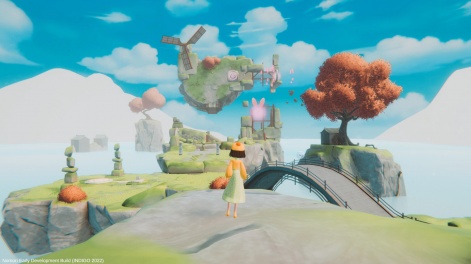
Looking at the studio a little more now. How hard is it to survive as an Indie developer?
It is hard, the market is completely saturated. Things that could have easily brought you success 10 years ago are no longer a guarantee. Just having a good game won’t be enough. You need to be smart. There are a lot of lessons to be had out there. Lessons that other developers have already learned the hard way. Talk and listen to many other developers, publishers, producers, investors, marketeers and journalists and learn from them. And read the vast amount of articles that are available online.
Right now marketing and getting people excited about your game before launch are quite possibly equally if not more important than the game itself. Having an interesting game helps in this regard. You have to leverage your strengths to the best of your abilities. Some devs even manage to leverage their personality to push their games. You have to maximize your opportunities for potential success to happen.
To make things harder in essence you're not even competing with just other similar games. You are competing with streaming services, social media, the news, websites, advertisements and mobile apps, not to mention life in general. Every second of every day there are so many things trying to catch a person's attention. But there are only so many hours in a single day.
It’s interesting, I know there are constantly heavy online debates on Twitter about value when it comes to games related to time spent playing. A recent big example is Stray. Which is about 5 hours of gameplay at the cost of 30 dollars compared to for instance Red Dead Redemption 2 which has about 50 hours of gameplay at the cost of 60 dollars. Now I haven’t played Red Dead Redemption 2, which from everyone I have spoken to is an absolute masterpiece. But I simply don’t have the time to sit down and enjoy it to its fullest extent. And therefore I don’t want to play it. It's an interesting question when it comes to game development, one that I don’t have an answer to.
My personal preference is shorter games that you can only experience to the fullest only once. Games like Antichamber, Inscryption and Journey. Games that leave a lasting impression and make me ponder what I just experienced after the game's completion.
Are there any tips and advice you would give to an independent developer out there who is just starting out?
Keep your eyes open for opportunities that have a chance to increase your success and act on them. One of our initial successes, when it came to attention, involved me searching for interesting free online events to participate in. On the day of the submission deadline, I stumbled upon the Tiny Teams Festival on STEAM hosted by the Yogscast. On the same day, we entered our game at the last possible moment. This while we technically didn’t meet the requirements. One of which was that you needed to have your game up on steam. And while we didn't have our steam page up yet. I knew what the appID was going to be and therefore what the link to our page would be. So I just sent in our application using an external link for a playable build of our game and a fake link to a steam page that didn't exist yet but would exist once steam approved it.
The worst thing that could happen was not being accepted. And with 700 submissions and only 50 accepted participants chances were very low. But you win some, you lose some.
Completely surprising us, we somehow got in.
Which meant all of a sudden we needed a steam page that actually existed. That turned out to be quite a hassle. And it wasn't until the evening of the 3rd day of the week-long event that our page came online.
All in all the event gave us 700 wishlists in four days for the Nomori: Prologue page where we currently share our glorified tech demo, which is free to play and that we will continue to update during the development of the game.
Now obviously, if you have the opportunity you should probably plan these things way ahead of time instead of jumping into the moment. But sometimes when you are also given an opportunity you need to seize it immediately. Funny enough the Big Indie Pitch happened in a very similar fashion. And if it wasn’t for taking the opportunity I wouldn’t be writing this massive wall of text as part of a written interview.
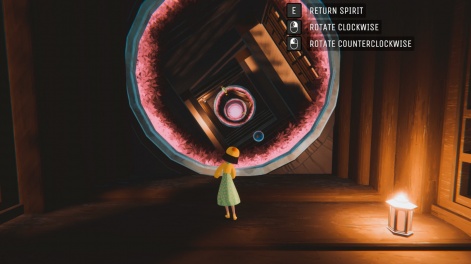
How did you find your experience pitching as a part of the Big Indie Pitch?
Gamescom in Cologne as a whole was our first big debut in the Games Industry, not so much for our game but mainly for our Studio. We signed up for Meet to Match and had 24 scheduled meetings with publishers, investors, event organizers and fellow developers. The Big Indie Pitch was the icing on the cake for us. I had been pitching the publishers and investors the entire day. So I sharpened my pitch close to perfection. I remember leaving the venue and one of the event organizers asking me how it went and me replying that I was on fire.
Talking with other devs beforehand and after the event was an absolute blast. And pitching to a jury of industry experts, scouts and publishers has definitely opened some doors for us.
What do you feel you have gained from the experience, and what do you still hope to gain?
The Big Indie Pitch was a big confidence boost for us as a studio. Combined with the reactions we had from publishers at Gamescom, it gave us the recognition that we are on the right track. We received so much valuable feedback and had many follow-ups with interesting people.
As a result of both the experience and the article that was posted on PCGameInsider.biz about the Big Indie Pitch, we have had several publishers reach out to us.
In January next year, we intend to visit Pocket Gamer Connects in London and show off the next milestones in our development.
As of right now, we are actively talking with several publishers and investors. Our main concern, same as many other indie developers, is securing funding.
What are your hopes for this game in the future, and do you have any plans for any future projects?
Right now our glorified tech demo has been added 27.000 times to people's steam library and even though the Nomori: Prologue is free 2800 people have added it to their wishlist and we had mainly positive reviews.
Now I know I have written a lot of my wisdom as replies to the interview questions. And some of you are rightfully wondering. You talk big, but you haven’t even shipped your first game yet. That is absolutely fair criticism. And I would urge anyone reading this far to take everything I have said with a grain of salt. But I’m not making my assessments based on intuition. I keep my eyes and ears open and talk and listen to people way more experienced than I am. I would urge other starting indie developers to do the same.
We know our foundations are strong, we have a clear timeline and have set clear goals, which are:
- Finishing our vertical slice in Q1 2023 and then adjusting the project scope accordingly.
- Finish the full game in Q3 2024 while gaining 80.000 wishlists before launch.
- Make sure we maximize our potential for success at every opportunity.
- Make sure we communicate well, so players' expectations align with what the game delivers.
- Deliver a good well-tested game, without major bugs.
As for after the release of Nomori, depending on its success we already have a prototype for a level editor which we hope to release as an expansion. Besides that, we also already have a prototype and plans for the next game we want to make afterwards. Something I will hopefully be able to pitch at a future Big Indie Pitch event.
If you are interested to see if we either soar through the skies like a unicorn two years from now or crash and burn, be sure to follow our company over on LinkedIn and keep your eyes open for us at Pocket Gamer Connects London.
Want to show off your exciting new game? We host Big Indie Pitch events throughout the year, so be sure to keep an eye out on our events page for an event near you, or even our new Digital pitches.
All our upcoming pitches including how to enter can be found over on our upcoming events page on BigIndiePitch.com.
Get the latest news, interviews and in-depth analysis on Twitter, Facebook, and our daily newsletter.

